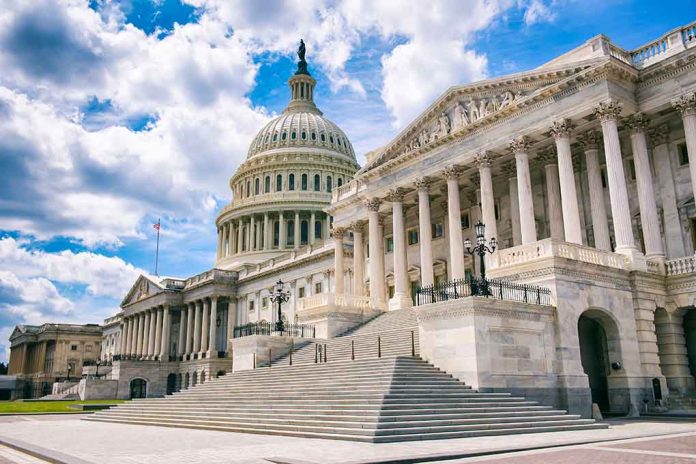
Senate Republicans and Democrats are locked in a high-stakes battle over cryptocurrency regulation as the GENIUS Act faces growing opposition despite multiple revisions.
Key Takeaways
- Senate Majority Leader John Thune is willing to consider Democratic amendments to the GENIUS Act before Thursday’s floor vote.
- Nine Democratic senators have withdrawn support, claiming the bill lacks adequate anti-money laundering and national security protections.
- Republicans need at least seven Democratic votes to reach the 60-vote threshold required to advance the legislation.
- The bill would create a federal framework for stablecoins, allowing non-bank issuers to operate with 1:1 reserve requirements.
- Recent cryptocurrency ventures by President Trump and family have intensified Democratic concerns about potential conflicts of interest.
Growing Democratic Opposition
The GENIUS Act (Guiding and Establishing National Innovation for U.S. Stablecoins Act), scheduled for a Senate floor vote Thursday, faces mounting resistance from Democratic lawmakers. Nine Democratic senators recently withdrew their support for the legislation, which aims to create a comprehensive federal framework for regulating payment stablecoins. The opposition includes key Banking Committee Democrats who initially supported earlier versions of the bill but now claim their concerns haven’t been adequately addressed.
Senate Democrats released a joint statement outlining their concerns, reading, “We have approached this process constructively and with an open mind, with the understanding that additional improvements to the bill would be made. However, the bill as it currently stands still has numerous issues that must be addressed, including adding stronger provisions on anti-money laundering, foreign issuers, national security, preserving the safety and soundness of our financial system, and accountability for those who don’t meet the act’s requirements.”
U.S. STABLECOIN BILL FACES DEMOCRATIC REVERSAL
Nine Senate Democrats have pulled support from the bipartisan GENIUS Act, citing national security, AML, and consumer protection concerns.
This surprise move threatens the bill’s progress and may delay stablecoin regulations.… pic.twitter.com/ACNUhIIyuO
— Crypto Town Hall (@Crypto_TownHall) May 4, 2025
Republican Compromise Efforts
Senate Majority Leader John Thune has signaled a willingness to compromise, acknowledging that “changes can be made on the floor for sure” while noting he’s “waiting to see what it is Democrats are asking for.” The GOP needs at least seven Democratic votes to reach the 60-vote threshold required to advance the legislation, making some level of compromise necessary. Republicans argue that the bill has already undergone six revisions based primarily on Democratic feedback.
Senator Bill Hagerty (R-Tenn.), a key proponent of the legislation, issued warning, “We cannot allow partisan games to derail the momentum we’ve seen over the past 3 months on this legislation.” The Republican leadership remains committed to bringing the bill to a floor vote despite the uncertainty surrounding its passage.
Complicating Factors
Recent cryptocurrency ventures by President Trump and his family have added another layer of complexity to the debate. Senator Elizabeth Warren (D-Mass.) has been particularly vocal in connecting these developments to her opposition to the bill. “The Trump family stablecoin surged to 7th largest in the world because of a shady crypto deal with the United Arab Emirates – a foreign government that will give them a crazy amount of money,” stated Warren.
The crypto industry has generally supported the GENIUS Act, emphasizing that regulatory clarity would enhance stablecoin adoption and strengthen U.S. dollar dominance in the digital economy. Industry leaders argue that without a federal framework, innovation might move offshore, putting America at a competitive disadvantage in the rapidly evolving digital asset space.
Path Forward
With Thursday’s vote approaching, the bill’s fate remains uncertain. Senate leadership must decide whether to delay the vote to allow for additional negotiations or proceed despite the likelihood of falling short of the required 60 votes. The legislation represents a significant test for bipartisan cooperation on cryptocurrency regulation, an area where traditional party lines are often blurred by varying perspectives on innovation, consumer protection, and financial security.
The outcome will likely shape the trajectory of digital asset regulation in the United States for years to come, determining whether America establishes clear rules for stablecoin issuers or continues with the current patchwork of regulations across different agencies and jurisdictions.
Sources:
Thune Signals GOP Willing to Compromise on Stablecoin Bill as Senate Vote Nears
Stablecoins bill faces hurdle after Democrats withdraw support
Senate eyes vote on stablecoin bill despite Democratic revolt







